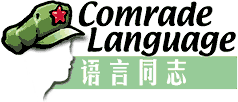|
Chinese people's names consist of a xing (surname), which goes first and
is usually a single character, and a ming (first name), which goes second and
consists of one or two characters. A person's xing is inherited from their father, just like in most civilized countries.
Most Chinese surnames are? danxing (consisting of only one character), but some are composed of two characters. These surnames are called
shuangxing or fuxing, and were much more common in ancient China than they are today. Some
examples of ancient shuangxing include Jiangjun (Army General), Guanjun
(Champion), Dashuai (Commander) and Mushi (Priest). Common shuangxing today include
Sima, Situ, Ouyang and Shangguan.
There are 11,939 surnames in use in China today. The most common of all Chinese surnames is 'Zhang. There are estimated to be 100,000,000 people
surnamed 'Zhang in China. That's about one 'Zhang in every twelve Chinese
people.
The runners-up for "most common name" in China are Wang and Li. There's even a popular
Suhua (colloquialism) that goes "Zhang Wang Li Zhao biandi Liu", naming the five most common Chinese
surnames.
The earliest surnames in China were Niu (Cow), Long (Dragon), Ma (Horse),
Xiong (Bear), and ª® Hua (Flower). And as China has 5,000 years of history and 1.2 billion people, there have even been people surnamed
Gou (Dog), She (Snake), Gui (Ghost), Tufa (Bald Spot) and Heichi (Black Teeth). In fact, modern-day surnames like Zhu and Lang
evolved from the ancient surnames Zhu (Pig) and Lang (Wolf).
The Comrade has gone through state demographics records and found the following surnames belonging to living Chinese people today: Dong, Nan,
Xi, Bei (East, South, West and North). Shang, Xia, Zuo, You (Top, Bottom, Left and Right).¥† Chun,
Xia, Qiu, Dong (Spring, Summer, Winter, and Fall).
Yue, Ri, Shi, Fen, Miao (Month, Day, Time, Minute and Second). Yi,
Er,
San, Si, Ling, Shi, Bai, Qian, Wan (One, Two, Three, Four, Zero, Hundred, Thousand and
Ten-Thousand).
Chenghu (Ways of Addressing People)
Chinese people have many ways of addressing each other. Wives call their
husbands waitou de ("the one outside the house"), zhanggui de
(a way of saying "boss") or dangjia de ("master of the household").
Husbands call their wives wuli de ("the one who stays at home"),
zuofande ("the food-maker") or nei dangjia de ("the one who takes care of the domestic issues"). Or they just shout endearments like?
Ai! ("Hey!") or ("Yo!") at each other.
Good friends call each other by their xiaoming (lit. "small name") or
ruming (lit. "breast name"). When old friends bump into each other on
the street they call each other by their surname, adding a "lao" ("old")
before it. Parents add a xiao ("little") to the front of their child's first name as a diminutive.
But the rule governing a child addressing his or her parents is delineated
in the ancient Chinese proverb: Zi buyan fuming (the child shall not utter the father's name). Out of
Zuning xianbei (respect for elders), Chinese people never call relatives by name. Instead they use the
proper, respective titles, all of which take many years to commit to memory.
Another way Chinese people address each other is by calling their huohao (nickname), or
aihao. A aihao is usually based on a noticeably peculiar aspect of one's appearance. For example, if someone
surnamed 'Zhang happens to have gigantic ears, his huohao might be
Zhang erduo (Zhang Big Ears).
Qi Mingzi (Naming Kids)
Chinese parents name their kids before they're born. That explains why many
girls have boy's names-because they're poor, the cursed parents were wishing for a boy. Parents who are unlucky enough to have a girl will often
name it something like Zhao Di ("beckon younger brother"), Lai Di
("come, younger brother") or Lian Di ("next, a little brother").
Then there's the practice of naming someone based on when they're born. For
example, someone named Kang Mei ("resist the Americans") was probably born during the Korean War
( Kang Mei being short for Kangmei Yuanchao, or "fight the Americans and aid the Koreans").
Guo Qing and Da Qing are names commonly given to those born around National Day.
Those born during the Wenhua Da Geming (Great Proletarian Cultural Revolution) are commonly named Wenge (Cultural Revolution),
or Weidong short for Baoei Mao Zedong Sixiang (defend Mao Zedong Thought).
Other names that give away Chinese people's age are Bao Hong, short
for Baowei Hongse Jiangshan ("defend Red China") and Yaowu ("want weapons") or
Aiwu ("love weapons"). These are names given by parents to their children to
demonstrate the child's patriotism and zealousness to die for the Motherland.
Henan, Zhengzhou and Kaifeng and their surrounding areas have a custom whereby the first morning after the birth of his child, the
father leaves the house to "pengxing", literally meaning "bump into a name." The father must
guixia ketou (get on his knees and kow-tow) to the very first person he sees, regardless of sex, age or social status.
Then he must announce "jiazhong shengle haizi" (a child has been born in our family). Next he must beseech this perfect stranger to
name his child! Being that the custom is mainly practiced in inland rural
China, and the father is usually out the door before the cock crows, eager
to find out what his newborn baby's name is going to be, many times the first person the father sees is nothing but a
hifen laotou, or a person who collects human and animal feces for use in fertilizing crops.
Since this is China, and you're not allowed to break from tradition (and
the pooper-scoopers aren't usually the most erudite people) it is not uncommon that people from these areas end up stuck with names like
Fenkuang ("fertilizer basket"), Luotou ("basket-head"), Gousheng ("dog leftovers") or
Zhuwa ("pig baby"). When kids end up with ridiculous names like these, the parents find consolation in the knowledge
that they are preserving the ancient tradition, regardless of how badly the
poor child gets teased and bullied by his or her classmates. |


